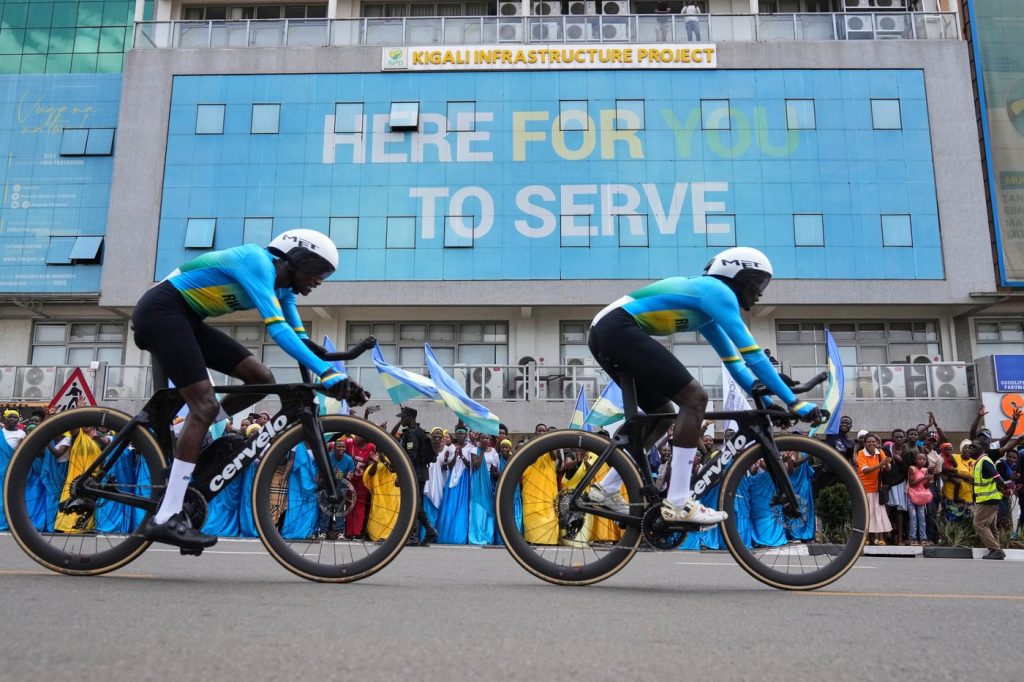KIGALI, Rwanda (AP) – Ronald Yiga, a 32-year-old cyclist from Uganda, was seen preparing for the road cycling world championships in Kigali, Rwanda—the first time this prestigious event has been hosted in Africa in its 104-year history. As he inspected his racing bicycle on a busy roadside in Kampala, dressed in black sweatpants and a brightly colored top, he expressed the excitement he and his teammates from the Fun Cycling Club feel about participating in an event that could significantly elevate the profile of cycling on the continent.
Yiga, who picked up cycling during the COVID-19 pandemic due to lockdown restrictions on public transport, emphasized the importance of this championship for African cyclists. "This is so big for the continent," he said. He looked forward to seeing Tadej Pogacar, the reigning road race world champion and multiple Tour de France winner, compete. Pogacar is expected to race in the men's elite road race on Sunday, following the women’s race scheduled for Saturday.
His teammate, Aziz Ssempijja, expressed aspirations beyond national representation, seeking opportunities for talent recognition that could further develop his skills. "This could open doors for us," echoed Rwandan national team cyclist Eric Manizabayo, signaling the potential for these championships to act as a launchpad for emerging talent in African cycling.
Many African cyclists, including those from countries like Mali and South Sudan, often compete on outdated bikes, yet their passion and resolve remain unshaken. Jacques Landry, director of the World Cycling Center, underscored that the championships could signify a pivotal moment in African cycling—projecting a future full of potential rather than merely reflecting the current state of the sport on the continent.
Across sub-Saharan Africa, cycling has often been linked to modest means and commuting. However, its popularity is on the rise, with more local competitions emerging that provide opportunities for young riders. The championships have attracted thousands of visitors to Kigali, where an estimated global audience of over 300 million is anticipated to watch athletes from around 100 nations compete, including the demanding men’s 273-kilometer road race set against Kigali's challenging, hilly terrain.
Moreover, local enthusiasts like Eric Mupenzi, a motorcycle taxi operator, voiced their pride: "This is our moment to show the world Rwanda's spirit." The anticipation extends beyond just the races; Rwandans aim to demonstrate unity and support as they fill the hills to cheer every rider. "We will cheer so loud that the world can hear us," vowed fan Jean de Dieu Uwimana.
Rwanda has strategically positioned itself as a hub for world-class cycling, capitalizing on its landscape to foster a cycling culture. Valentin Bigango, vice president of the Rwanda Cycling Federation, noted the significant growth from community competitions to hosting major international events, emphasizing the long-term vision of inspiring young talent and boosting tourism across Africa.
Rwanda's push into the international sporting arena comes under the leadership of President Paul Kagame, who has invested heavily in sports infrastructure, including high-profile venues and partnerships with international sporting entities. Kagame's vision includes turning sports into a substantial economic catalyst for Africa's growth.
However, Rwanda's sporting ambitions have not been without criticism. Rights groups have accused the government of using such events to perform "sportswashing" amidst allegations of repression. The ongoing conflict in eastern Congo has further fueled skepticism surrounding the governance and intentions behind hosting the championships.
Despite the controversies, the enthusiasm among the local populace remains palpable. Motorcycle taxi operators take breaks to discuss favorite cyclists, vendors gather along race routes, and children cheer excitedly. For Ugandan cyclists like Yiga and Ssempijja, the championships represent an opportunity to showcase African potential on a global stage, a step towards dispelling the notion that cycling is exclusive to Europe.











